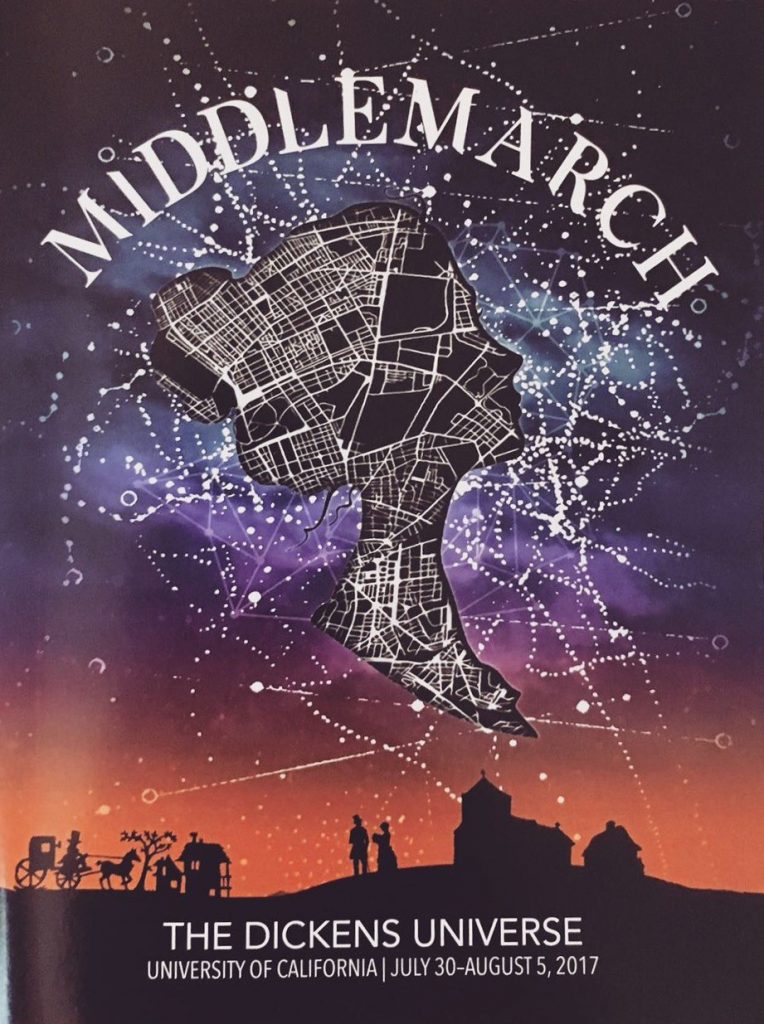“Dickens Universe is a unique event: part-conference, part-festival, populated with Victorian literature enthusiasts. I was lucky enough to attend the 37th Dickens Universe as Kent’s graduate student representative, and was truly grateful for this opportunity. I attended along with Dr Sara Lyons, who represented Kent’s faculty. 2017 marked an unusual change in the format of Dickens Universe: this year, for the first time, we didn’t focus on a Dickens novel. The event metamorphosed into Eliot Universe, as we studied George Eliot’s Middlemarch.
Eliot Universe took place over the course of a week, and we arrived at the University of California at Santa Cruz at the end of July. A diverse range of people attend the conference: eminent academics, graduate students, the Friends of the Dickens Project and members of the general public. The setting itself is idyllic: the campus is set amongst the redwood forests, with a view stretching out to the ocean, and the morning fog gives way to perfectly sunny afternoons. Deer, squirrels, turkeys and even the odd racoon were spotted marching around the campus, contributing all the more to the fairy-tale atmosphere. We were welcomed by John Jordan, director of the Dickens Project (also known as ‘Master of the Universe’), and a delicious dinner.
A wide range of activities took place over the week: at least once a day, though, all attendees gathered for the keynote lectures. Internationally renowned academics provided a range of perspectives on Middlemarch. To name a few: David Kurnick (Rutgers) commenced the week by discussing ecstasy in the novel; Summer Star (San Francisco State) spoke on attention, multi-tasking an the many minds of Middlemarch; Jill Galvan (Ohio State) provided fresh perspectives on how the novel deals with romance and marriage; Jos Lavery (UC Berkeley) gave an intriguing trans reading of the novel, focusing on the use of pronouns; Helen Michie (Rice University) spoke beautifully on connection and disconnection; Ruth Livesey (Royal Holloway) articulated ideas about the middle, in both geographical and formal terms; and on the final day, George Levine (Rutgers) argued for ways of seeing Eliot as a Dickensian author.
Each day was packed with a number of other activities, too: each graduate student takes on a particular workshop or ‘job’, with options including pedagogy, publication, writing, and team-teaching members of the general public. I went to the presentation workshops, led by Robyn Warhol and Simon Rennie. The workshops were filled with useful tips, and we discussed how to most effectively present one’s work, either at conferences or during job talks. The small groups that comprised these workshops provided an excellent space to both learn and exchange ideas on some of the essential features of working within academia. We also attended professionalization seminars, to help prepare graduate students for working life. My seminar involved discussing the significance of public humanities, and was inspiring in providing ideas of how academics might best work with the wider public. In the afternoons, graduate students got to attend faculty-led seminars; in my group, we discussed numerous passages of Middlemarch. For me, the conversations about Eliot, which sparked many fresh ideas about the novel, were one of the highlights of the week.
Eliot Universe also provided plenty of opportunities to network and socialise: being a residential event gave us plenty of time to meet with fellow Eliot enthusiasts. Victorian tea was provided in the afternoons by the Friends of the Dickens Project. Meals were had all together, and dinners were followed by Post-Prandial Potations (known as PPP), a chance for a drink and to reflect on the day before the evening lecture. The Cruise Directors – graduate students who ran social events – provided us with a party every night to wind down and meet with other students. The Friends of the Dickens Project also ran a grand party (in a room filled with tables laden with cheese and cake) and an auction; the final night culminated in a Victorian Dance.
The emphasis that the week laid upon both learning about Middlemarch through seminars and lectures, and on meeting fellow Eliot enthusiasts through social events, created a sense of community unlike any other conference I have been to. A book club, a summer camp, a conference, a festival: these are all words I have used to attempt to describe Dickens Universe to others who haven’t yet been. It is an extraordinary experience, for which I am hugely grateful; I’m sure next year’s representative will have an excellent time too.”
– Jessica Gray, Assistant Lecturer and PhD Student in the School of English

